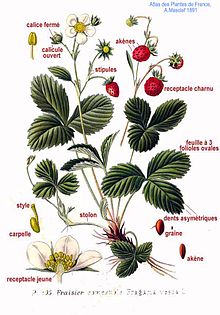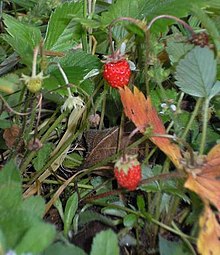This is an old revision of this page, as edited by Mk170101 (talk | contribs) at 19:54, 2 November 2021 (→Diploid species: alphabetical fix). The present address (URL) is a permanent link to this revision, which may differ significantly from the current revision.
Revision as of 19:54, 2 November 2021 by Mk170101 (talk | contribs) (→Diploid species: alphabetical fix)(diff) ← Previous revision | Latest revision (diff) | Newer revision → (diff) Genus of strawberry plants This article is about the plant genus. For the most commonly cultivated strawberry, see Strawberry.
| Fragaria | |
|---|---|

| |
| Fragaria vesca illustration from Atlas des plantes de France 1891, by A. Masclef | |
| Scientific classification | |
| Kingdom: | Plantae |
| Clade: | Tracheophytes |
| Clade: | Angiosperms |
| Clade: | Eudicots |
| Clade: | Rosids |
| Order: | Rosales |
| Family: | Rosaceae |
| Subfamily: | Rosoideae |
| Tribe: | Potentilleae |
| Subtribe: | Fragariinae |
| Genus: | Fragaria L. |
| Species | |
|
20+ species; see text | |
Fragaria /frəˈɡɛəriə/ is a genus of flowering plants in the rose family, Rosaceae, commonly known as strawberries for their edible fruits. There are more than 20 described species and many hybrids and cultivars. The most common strawberries grown commercially are cultivars of the garden strawberry, a hybrid known as Fragaria × ananassa. Strawberries have a taste that varies by cultivar, and ranges from quite sweet to rather tart. Strawberries are an important commercial fruit crop, widely grown in all temperate regions of the world.
Description
Strawberries are not true berries. The fleshy and edible part of the "fruit" is a receptacle, and the parts that are sometimes mistakenly called "seeds" are achenes and therefore the true botanical fruits.
Etymology
The latin name derives from the verb fragro, referring to the aroma of the fruit. Although it is commonly thought that strawberries get their name from straw being used as a mulch in cultivating the plants, the word is possibly derived from "strewn berry" in reference to the runners that "strew" or "stray away" from the base of the plants. David Mikkelson argues that "the word 'strawberry' has been part of the English language for at least a thousand years, well before strawberries were cultivated as garden or farm edibles."
Classification
There are more than 20 different Fragaria species worldwide. A number of other species have been proposed, some of which are now recognized as subspecies. One key to the classification of strawberry species is that they vary in the number of chromosomes. They all have seven basic types of chromosomes, but exhibit different polyploidy. Some species are diploid, having two sets of the seven chromosomes (14 chromosomes total), but others are tetraploid (four sets, 28 chromosomes total), hexaploid (six sets, 42 chromosomes total), octoploid (eight sets, 56 chromosomes total), or decaploid (ten sets, 70 chromosomes total).
As a rough rule (with exceptions), strawberry species with more chromosomes tend to be more robust and produce larger plants with larger berries.
Diploid species





- Fragaria × bifera Duchesne - F. vesca × F. viridis (Europe)
- Fragaria bucharica Losinsk. (China)
- Fragaria daltoniana J.Gay (Himalayas)
- Fragaria emeiensis Jia J. Lei (China)
- Fragaria gracilis Losinsk. (China)
- Fragaria iinumae Makino (East Russia, Japan)
- Fragaria mandshurica Staudt (China)
- Fragaria nilgerrensis Schlecht. ex J.Gay (South and Southeast Asia)
- Fragaria nipponica Makino (Korea, Japan)
- Fragaria nubicola Lindl. ex Lacaita (Himalayas)
- Fragaria pentaphylla Losinsk. (China)
- Fragaria vesca L. - woodland strawberry (Northern Hemisphere)
- Fragaria viridis Duchesne (Europe, Central Asia)
- Fragaria yezoensis H.Hara (Northeast Asia)
Tetraploid species
- Fragaria moupinensis Cardot (China)
- Fragaria orientalis Losinsk. (Eastern Asia, Eastern Siberia)
Pentaploid hybrids
- Fragaria × bringhurstii Staudt (coast of California)
Hexaploid species
- Fragaria moschata Duchesne - musk strawberry (Europe)
Octoploid species and hybrids
- Fragaria × ananassa Duchesne ex Rozier - garden strawberry, pineapple strawberry
- Fragaria chiloensis (L.) Mill. - beach strawberry (Western Americas)
- Fragaria chiloensis subsp. chiloensis forma chiloensis
- Fragaria chiloensis subsp. chiloensis forma patagonica (Argentina, Chile)
- Fragaria chiloensis subsp. lucida (E. Vilm. ex Gay) Staudt (coast of British Columbia, Washington, Oregon, California)
- Fragaria chiloensis subsp. pacifica Staudt (coast of Alaska, British Columbia, Washington, Oregon, California)
- Fragaria chiloensis subsp. sandwicensis (Decne.) Staudt - ʻōhelo papa (Hawaiʻi)
- Fragaria virginiana Mill. - Virginia strawberry (North America)
Decaploid species and hybrids
- Fragaria cascadensis K.E. Hummer (Cascade Mountains in Oregon)
- Fragaria iturupensis Staudt - Iturup strawberry (Iturup, Kuril Islands)
- Fragaria × Comarum hybrids
- Fragaria × vescana
Uncategorized hybrids
- 'Lipstick' (Fragaria × Comarum hybrid), red-flowered runnering ornamental, sparse small globular fruits.
- Fragaria vesca and certain other diploid species can be hybridized and produce fertile offspring (although Fragaria nilgerrensis appears less compatible).
- Fragaria moschata can hybridize with diploid species such as Fragaria viridis and Fragaria nubicola but producing a lower proportion of viable seeds.
- Fragaria moschata can hybridize with Fragaria × ananassa.
Ecology
A number of species of butterflies and moths feed on strawberry plants: see list of Lepidoptera that feed on strawberry plants.
See also
- Accessory fruit
- Mock strawberry (Duchesnea/Potentilla indica) and barren strawberry (Potentilla sterilis, Waldsteinia fragarioides) are closely related species in other genera which resemble Fragaria.
- Strawberry tree (disambiguation) is a name for several trees that are unrelated to strawberry.
- The breeding of strawberries
References
- Sunset Western Garden Book, 1995:606–607
- ^ Esau, K. 1977. Anatomy of seed plants. John Wiley and Sons, New York.
- E-Flora BC: Electronic Atlas of the Plants of British Columbia: Fragaria virginiana.
- "Etymology of Strawberry". Snopes.com. Retrieved 2013-05-08.
- Darrow, G.M. (1966). The Strawberry: History, Breeding and Physiology 3. Early History of the Strawberry: 16
- "Species records in the database (for the query: genus = Fragaria)". U.S. National Plant Germplasm System. Retrieved 2017-08-24.
- Darrow, George M. The Strawberry: History, Breeding and Physiology. New York. Holt, Rinehart and Winston, 1966. online text
- Hummer, K.E. (2012). "A new species of Fragaria (Roseaceae) from Oregon". Journal of Botanical Research Institute of Texas. 6 (1): 9–15. Retrieved 2012-06-10.
- Bors, R.H.; Sullivan, J.A. (2005). "Interspecific Hybridization of Fragaria vesca subspecies with F. nilgerrensis, F. nubicola, F. pentaphylla, and F. viridis" (PDF). J. Am. Soc. Hort. Sci. 130 (3): 418–423. doi:10.21273/JASHS.130.3.418.
- Bors, Robert H.; Sullivan, J. Alan (August 1996). "Production of Interspecific Hybrids between Hexaploid Fragaria moschata and the diploid species F. nubicola and F. viridis". HortScience. 31 (4): 610. doi:10.21273/HORTSCI.31.4.610b.
- Karp, David (July 2006). "Berried Treasure". Smithsonian Magazine.
Further reading
- Hogan, Sean (chief consultant) (2003), Flora: A Gardener's Encyclopedia, Portland, Oregon: Timber Press. ISBN 0-88192-538-1.
External links
- Species records in the database (for the query: genus = Fragaria) from the U.S. National Plant Germplasm System website
| Strawberries | ||
|---|---|---|
| Species |
|  |
| Strawberry cultivars | ||
| Breeders | ||
| Dishes | ||
| Pest and diseases | ||
| See also | ||
| Taxon identifiers | |
|---|---|
| Fragaria |
|